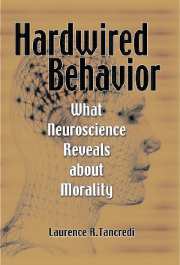Book contents
- Frontmatter
- Contents
- Preface
- Acknowledgments
- 1 Neuroscience and Morality
- 2 Morality and the Mind
- 3 Beyond the Mind Zone
- 4 The Moral Brain
- 5 Bad without Conscience
- 6 The Biology of Choice
- 7 Sex and the Single Moral Code
- 8 Brain Biology and Sex
- 9 Deception
- 10 The Biology of Money
- 11 The Bad and the Mad
- 12 Creating a Moral Brain
- Notes
- Glossary
- Index
1 - Neuroscience and Morality
Published online by Cambridge University Press: 13 October 2009
- Frontmatter
- Contents
- Preface
- Acknowledgments
- 1 Neuroscience and Morality
- 2 Morality and the Mind
- 3 Beyond the Mind Zone
- 4 The Moral Brain
- 5 Bad without Conscience
- 6 The Biology of Choice
- 7 Sex and the Single Moral Code
- 8 Brain Biology and Sex
- 9 Deception
- 10 The Biology of Money
- 11 The Bad and the Mad
- 12 Creating a Moral Brain
- Notes
- Glossary
- Index
Summary
Neuroscience advances during the past few decades have been nothing short of astounding. Our notions about how the brain works and the relationship between mind and brain have been radically changed as we have come to understand how parts of the brain function to provide a wide range of human functions – from shortand long-term memory to the production of fear when certain areas of the brain (most particularly, the amygdala) are activated, and to how the brain's cognitive centers influence and are influenced by regions of the brain that produce emotions.
Many traditional notions of the “mind” as it reflects a dichotomy between mind and body are being revised. Evidence that the brain “makes” the mind is strengthening with indications that brain and mind are not two entirely different realms, but rather that the physical brain has the major role in creating and shaping our emotions and thinking.
With these ideas in mind, I began wondering about the impact of the brain on moral thinking. Because the brain is basic to decision making, it must play a powerful role in our thinking regarding moral issues, and consequently in the way we treat each other in our society to maintain order and uphold fairness, individual rights, and equity. Through my research on these issues as they involve a wide range of behavior, I learned that much thinking and some research have already gone into the impact of neuroscience on morality. Our view of morality has already been altered by new understanding of brain biology, and at the rate that new discoveries are being made, that view will change even more in the future.
- Type
- Chapter
- Information
- Hardwired BehaviorWhat Neuroscience Reveals about Morality, pp. 1 - 11Publisher: Cambridge University PressPrint publication year: 2005



